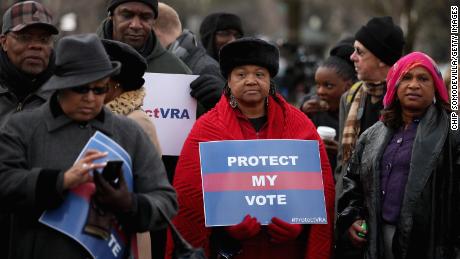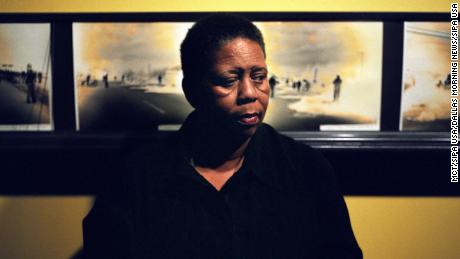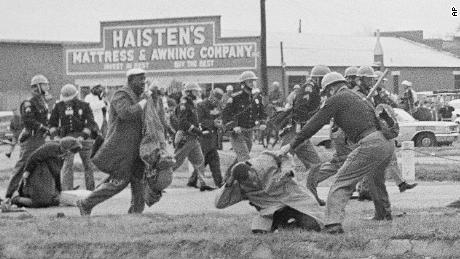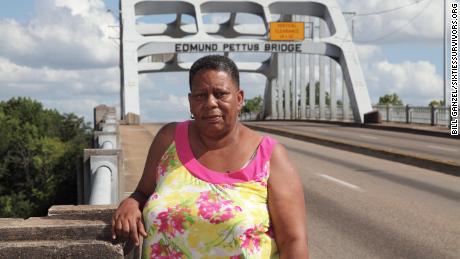Baton-wielding state troopers and horse-mountedmembers of the sheriff's posse, plunged into the peaceful crowd that day in March 1965, breaking bones and cracking skulls. Bland's 14-year-old sister Linda, standing not far behind march leaders John Lewis and Hosea Williams, was struck in the face and the back of the head. "It was horrible," Bland recalls now. "There was this one lady, I don't know if the horse ran over her or if she fell, but all these years later, I can still hear the sound of her head hitting that pavement."The march — known as Bloody Sunday — so shocked the nation that it helped mobilize Congress to pass the Voting Rights Act. That landmark legislation finally dismantled the Jim Crow-era laws that relied on obscure civics tests, discriminatory poll taxes and violence to deny full citizenship to all Americans.But today, 55 years later, Bland feels as though she's re-living parts of the past as she surveys a country riven by racial tension, where Black men and women die too often at the hands of police, and in which states press ahead with purging voters from their rolls and enforcing strict voter identification laws — even as a once-in-a-century pandemic stalks their citizens."Sometimes I wake up and I think we are paralleling the 60s all over again," Bland said in an interview from her home in Selma, where she leads tours of the city's civil rights landmarks. "The laws that they passed to prevent African Americans from voting were insurmountable, and states could make up their own rules. That's pretty much where this is going now."
History repeated
Once again, Alabama is among the states at the forefront of the battles over voting. A cluster of voting-rights groups has sued the Secretary of State John Merrill and other election officials over requirements that voters casting ballots by mail must make a copy of their photo identification and sign their ballots in front of two witnesses or a notary public. The groups also want the state to allow curbside voting.Forcing voters to meet those requirements and have contact with other people in the middle of a pandemic, puts Alabamians who potentially face serious health consequences from the coronavirus at greater risk, said Caren Short, a senior staff attorney with the Southern Poverty Law Center, one of the groups suing over the restrictions. Although African Americans make up only about 27% of Alabama's population, they have accounted for nearly 40% of confirmed Covid-19 deaths in the state, according to the state's Department of Public Health. Short credits Alabama officials with moving to expand votingby mail because of the pandemic, but she said that's not good enough. "Alabama is the birthplace of the civil rights movement, and it's the birthplace of the voting rights movement," she said. "It really should be the state where officials are making it as simple and as easy a process as possible for citizens to vote."Merrill told CNN the voter ID and witness requirements are enshrined in state law and can't be suspended. "We don't have the ability to set aside state law because we're not interested in it or because we don't think it's appropriate at this time," he said. He said his overarching goal as secretary of state is to "make it easy to vote and hard to cheat."
A supreme fight
The skirmish is just the latest legal battle in Alabama over voting rules. The most consequential for the state and the nation came in 2013 when the Supreme Court sided with Shelby County, Alabama, in a challenge to federal oversight in places with a history of discrimination. The Shelby ruling defanged the Voting Rights Act by tossing out the portion of the law that determined which states needed approval from the US Department of Justice or a federal court before they could make changes to their voting procedures and laws. Before the ruling, those blanket rules meant states needed prior permission to make changes, big and small, to their voting practices — ranging from moving a polling place to redrawing electoral districts or changing the date of an election.The case centered on a local redistricting plan from Shelby County, but the 5-4 decision reverberated across the nation, especially in the nine states and parts of six others that required so-called pre-clearance of voting changes.Within hours of the high court's decision, Texas — one of the states subject to pre-clearance — announced voter identification rules would take effect in the state. Alabama and other states, including Mississippi, began to enforce strict voter ID laws. Other states have enacted new restrictions, such as signature match laws that require a voter's signature on an absentee ballot to match their signature on voting rolls. Post-Shelby, it's now up to the Justice Department, individuals and groups to pursue court challenges of voting laws they view as discriminatory. Rick Hasen, an expert on election law at the University of California, Irvine, and a CNN contributor, said the Obama administration filed "litigation where they could." But the Trump administration's record protecting voting rights has been "abysmal," he said. "I can't think of a single thing that the Trump administration has done, coming out of the Justice Department, to help minority voters."In Alabama, Merrill, who helped write his state's voter ID law while serving in the state legislature, disputes that Alabama laws have made it harder for any Black voters to cast their ballots in the state. Voter registration has soared during his tenure, he said, with 96% of eligible African American residents registered to vote, compared to 91% of White Alabamians. He said the state works to make sure every qualified voter has photo identification.In Georgia, a potential presidential battleground state this year, battles have raged over the state's aggressive removal of voters from registration rolls. Voting rights groups have accused the state of improperly purging legitimate voters; state officials say they are engaged in routine list maintenance.
The Shelby ruling defanged the Voting Rights Act by tossing out the portion of the law that determined which states needed approval from the US Department of Justice or a federal court before they could make changes to their voting procedures and laws. Before the ruling, those blanket rules meant states needed prior permission to make changes, big and small, to their voting practices — ranging from moving a polling place to redrawing electoral districts or changing the date of an election.The case centered on a local redistricting plan from Shelby County, but the 5-4 decision reverberated across the nation, especially in the nine states and parts of six others that required so-called pre-clearance of voting changes.Within hours of the high court's decision, Texas — one of the states subject to pre-clearance — announced voter identification rules would take effect in the state. Alabama and other states, including Mississippi, began to enforce strict voter ID laws. Other states have enacted new restrictions, such as signature match laws that require a voter's signature on an absentee ballot to match their signature on voting rolls. Post-Shelby, it's now up to the Justice Department, individuals and groups to pursue court challenges of voting laws they view as discriminatory. Rick Hasen, an expert on election law at the University of California, Irvine, and a CNN contributor, said the Obama administration filed "litigation where they could." But the Trump administration's record protecting voting rights has been "abysmal," he said. "I can't think of a single thing that the Trump administration has done, coming out of the Justice Department, to help minority voters."In Alabama, Merrill, who helped write his state's voter ID law while serving in the state legislature, disputes that Alabama laws have made it harder for any Black voters to cast their ballots in the state. Voter registration has soared during his tenure, he said, with 96% of eligible African American residents registered to vote, compared to 91% of White Alabamians. He said the state works to make sure every qualified voter has photo identification.In Georgia, a potential presidential battleground state this year, battles have raged over the state's aggressive removal of voters from registration rolls. Voting rights groups have accused the state of improperly purging legitimate voters; state officials say they are engaged in routine list maintenance. Bland, now 67, has followed the raft of new laws from Selma — a city she returned to in 1989 after stints in the US Army and timeliving in Florida and New York."Purging the rolls, closing down polls in rural communities, requiring an exact signature," she said ticking off the changes she's seen across the country. "But we're not going to let them discourage us. We'll follow their rules until we can change them."
Bland, now 67, has followed the raft of new laws from Selma — a city she returned to in 1989 after stints in the US Army and timeliving in Florida and New York."Purging the rolls, closing down polls in rural communities, requiring an exact signature," she said ticking off the changes she's seen across the country. "But we're not going to let them discourage us. We'll follow their rules until we can change them."
Young freedom fighter
Bland was exposed to voting rights fights at a young age. Her mother died in childbirth when Bland was just three, and her grandmother, Sylvia Johnson, moved back to her native Alabama from Detroitto help care for the family, Bland said.Bland said her grandmother was shocked by how little had changed. Barriers to voting still included poll taxes and literacy tests, that among other things, required would-be voters to read aloud parts of the Alabama state Constitution, know the exact size of Washington, DC, as spelled out in the US Constitution (10 square miles) and which of the original 13 states had the largest representation in the first Congress (Virginia). The answers were "impossible to know unless you were a civics genius," changed frequently and varied by county — all in "in a concerted effort to make it as difficult as possible for individuals to pass," said John Giggie, who directs of the Frances J. Summersell Center for the Study of the South at the University of Alabama in Tuscaloosa.Local officials had discretion over who got the hardest questions and what it took to pass the tests.In 1965, before the passage of the Voting Rights Act, only about 2.1% of voting-age Black residents of Dallas County, where Selma is located, were registered.Johnson, with all four of her grandchildren in tow, began to attend mass meetings of the Dallas County Voters League, led by Amelia Boynton, one of Selma's civil-rights pioneers. While the adults talked strategy, Bland said she was focused on more prosaic issues: chiefly, how to gain access to thRead More – Source
The answers were "impossible to know unless you were a civics genius," changed frequently and varied by county — all in "in a concerted effort to make it as difficult as possible for individuals to pass," said John Giggie, who directs of the Frances J. Summersell Center for the Study of the South at the University of Alabama in Tuscaloosa.Local officials had discretion over who got the hardest questions and what it took to pass the tests.In 1965, before the passage of the Voting Rights Act, only about 2.1% of voting-age Black residents of Dallas County, where Selma is located, were registered.Johnson, with all four of her grandchildren in tow, began to attend mass meetings of the Dallas County Voters League, led by Amelia Boynton, one of Selma's civil-rights pioneers. While the adults talked strategy, Bland said she was focused on more prosaic issues: chiefly, how to gain access to thRead More – Source
Baton-wielding state troopers and horse-mountedmembers of the sheriff's posse, plunged into the peaceful crowd that day in March 1965, breaking bones and cracking skulls. Bland's 14-year-old sister Linda, standing not far behind march leaders John Lewis and Hosea Williams, was struck in the face and the back of the head. "It was horrible," Bland recalls now. "There was this one lady, I don't know if the horse ran over her or if she fell, but all these years later, I can still hear the sound of her head hitting that pavement."The march — known as Bloody Sunday — so shocked the nation that it helped mobilize Congress to pass the Voting Rights Act. That landmark legislation finally dismantled the Jim Crow-era laws that relied on obscure civics tests, discriminatory poll taxes and violence to deny full citizenship to all Americans.But today, 55 years later, Bland feels as though she's re-living parts of the past as she surveys a country riven by racial tension, where Black men and women die too often at the hands of police, and in which states press ahead with purging voters from their rolls and enforcing strict voter identification laws — even as a once-in-a-century pandemic stalks their citizens."Sometimes I wake up and I think we are paralleling the 60s all over again," Bland said in an interview from her home in Selma, where she leads tours of the city's civil rights landmarks. "The laws that they passed to prevent African Americans from voting were insurmountable, and states could make up their own rules. That's pretty much where this is going now."
History repeated
Once again, Alabama is among the states at the forefront of the battles over voting. A cluster of voting-rights groups has sued the Secretary of State John Merrill and other election officials over requirements that voters casting ballots by mail must make a copy of their photo identification and sign their ballots in front of two witnesses or a notary public. The groups also want the state to allow curbside voting.Forcing voters to meet those requirements and have contact with other people in the middle of a pandemic, puts Alabamians who potentially face serious health consequences from the coronavirus at greater risk, said Caren Short, a senior staff attorney with the Southern Poverty Law Center, one of the groups suing over the restrictions. Although African Americans make up only about 27% of Alabama's population, they have accounted for nearly 40% of confirmed Covid-19 deaths in the state, according to the state's Department of Public Health. Short credits Alabama officials with moving to expand votingby mail because of the pandemic, but she said that's not good enough. "Alabama is the birthplace of the civil rights movement, and it's the birthplace of the voting rights movement," she said. "It really should be the state where officials are making it as simple and as easy a process as possible for citizens to vote."Merrill told CNN the voter ID and witness requirements are enshrined in state law and can't be suspended. "We don't have the ability to set aside state law because we're not interested in it or because we don't think it's appropriate at this time," he said. He said his overarching goal as secretary of state is to "make it easy to vote and hard to cheat."
A supreme fight
The skirmish is just the latest legal battle in Alabama over voting rules. The most consequential for the state and the nation came in 2013 when the Supreme Court sided with Shelby County, Alabama, in a challenge to federal oversight in places with a history of discrimination. The Shelby ruling defanged the Voting Rights Act by tossing out the portion of the law that determined which states needed approval from the US Department of Justice or a federal court before they could make changes to their voting procedures and laws. Before the ruling, those blanket rules meant states needed prior permission to make changes, big and small, to their voting practices — ranging from moving a polling place to redrawing electoral districts or changing the date of an election.The case centered on a local redistricting plan from Shelby County, but the 5-4 decision reverberated across the nation, especially in the nine states and parts of six others that required so-called pre-clearance of voting changes.Within hours of the high court's decision, Texas — one of the states subject to pre-clearance — announced voter identification rules would take effect in the state. Alabama and other states, including Mississippi, began to enforce strict voter ID laws. Other states have enacted new restrictions, such as signature match laws that require a voter's signature on an absentee ballot to match their signature on voting rolls. Post-Shelby, it's now up to the Justice Department, individuals and groups to pursue court challenges of voting laws they view as discriminatory. Rick Hasen, an expert on election law at the University of California, Irvine, and a CNN contributor, said the Obama administration filed "litigation where they could." But the Trump administration's record protecting voting rights has been "abysmal," he said. "I can't think of a single thing that the Trump administration has done, coming out of the Justice Department, to help minority voters."In Alabama, Merrill, who helped write his state's voter ID law while serving in the state legislature, disputes that Alabama laws have made it harder for any Black voters to cast their ballots in the state. Voter registration has soared during his tenure, he said, with 96% of eligible African American residents registered to vote, compared to 91% of White Alabamians. He said the state works to make sure every qualified voter has photo identification.In Georgia, a potential presidential battleground state this year, battles have raged over the state's aggressive removal of voters from registration rolls. Voting rights groups have accused the state of improperly purging legitimate voters; state officials say they are engaged in routine list maintenance.
The Shelby ruling defanged the Voting Rights Act by tossing out the portion of the law that determined which states needed approval from the US Department of Justice or a federal court before they could make changes to their voting procedures and laws. Before the ruling, those blanket rules meant states needed prior permission to make changes, big and small, to their voting practices — ranging from moving a polling place to redrawing electoral districts or changing the date of an election.The case centered on a local redistricting plan from Shelby County, but the 5-4 decision reverberated across the nation, especially in the nine states and parts of six others that required so-called pre-clearance of voting changes.Within hours of the high court's decision, Texas — one of the states subject to pre-clearance — announced voter identification rules would take effect in the state. Alabama and other states, including Mississippi, began to enforce strict voter ID laws. Other states have enacted new restrictions, such as signature match laws that require a voter's signature on an absentee ballot to match their signature on voting rolls. Post-Shelby, it's now up to the Justice Department, individuals and groups to pursue court challenges of voting laws they view as discriminatory. Rick Hasen, an expert on election law at the University of California, Irvine, and a CNN contributor, said the Obama administration filed "litigation where they could." But the Trump administration's record protecting voting rights has been "abysmal," he said. "I can't think of a single thing that the Trump administration has done, coming out of the Justice Department, to help minority voters."In Alabama, Merrill, who helped write his state's voter ID law while serving in the state legislature, disputes that Alabama laws have made it harder for any Black voters to cast their ballots in the state. Voter registration has soared during his tenure, he said, with 96% of eligible African American residents registered to vote, compared to 91% of White Alabamians. He said the state works to make sure every qualified voter has photo identification.In Georgia, a potential presidential battleground state this year, battles have raged over the state's aggressive removal of voters from registration rolls. Voting rights groups have accused the state of improperly purging legitimate voters; state officials say they are engaged in routine list maintenance. Bland, now 67, has followed the raft of new laws from Selma — a city she returned to in 1989 after stints in the US Army and timeliving in Florida and New York."Purging the rolls, closing down polls in rural communities, requiring an exact signature," she said ticking off the changes she's seen across the country. "But we're not going to let them discourage us. We'll follow their rules until we can change them."
Bland, now 67, has followed the raft of new laws from Selma — a city she returned to in 1989 after stints in the US Army and timeliving in Florida and New York."Purging the rolls, closing down polls in rural communities, requiring an exact signature," she said ticking off the changes she's seen across the country. "But we're not going to let them discourage us. We'll follow their rules until we can change them."
Young freedom fighter
Bland was exposed to voting rights fights at a young age. Her mother died in childbirth when Bland was just three, and her grandmother, Sylvia Johnson, moved back to her native Alabama from Detroitto help care for the family, Bland said.Bland said her grandmother was shocked by how little had changed. Barriers to voting still included poll taxes and literacy tests, that among other things, required would-be voters to read aloud parts of the Alabama state Constitution, know the exact size of Washington, DC, as spelled out in the US Constitution (10 square miles) and which of the original 13 states had the largest representation in the first Congress (Virginia). The answers were "impossible to know unless you were a civics genius," changed frequently and varied by county — all in "in a concerted effort to make it as difficult as possible for individuals to pass," said John Giggie, who directs of the Frances J. Summersell Center for the Study of the South at the University of Alabama in Tuscaloosa.Local officials had discretion over who got the hardest questions and what it took to pass the tests.In 1965, before the passage of the Voting Rights Act, only about 2.1% of voting-age Black residents of Dallas County, where Selma is located, were registered.Johnson, with all four of her grandchildren in tow, began to attend mass meetings of the Dallas County Voters League, led by Amelia Boynton, one of Selma's civil-rights pioneers. While the adults talked strategy, Bland said she was focused on more prosaic issues: chiefly, how to gain access to thRead More – Source
The answers were "impossible to know unless you were a civics genius," changed frequently and varied by county — all in "in a concerted effort to make it as difficult as possible for individuals to pass," said John Giggie, who directs of the Frances J. Summersell Center for the Study of the South at the University of Alabama in Tuscaloosa.Local officials had discretion over who got the hardest questions and what it took to pass the tests.In 1965, before the passage of the Voting Rights Act, only about 2.1% of voting-age Black residents of Dallas County, where Selma is located, were registered.Johnson, with all four of her grandchildren in tow, began to attend mass meetings of the Dallas County Voters League, led by Amelia Boynton, one of Selma's civil-rights pioneers. While the adults talked strategy, Bland said she was focused on more prosaic issues: chiefly, how to gain access to thRead More – Source










